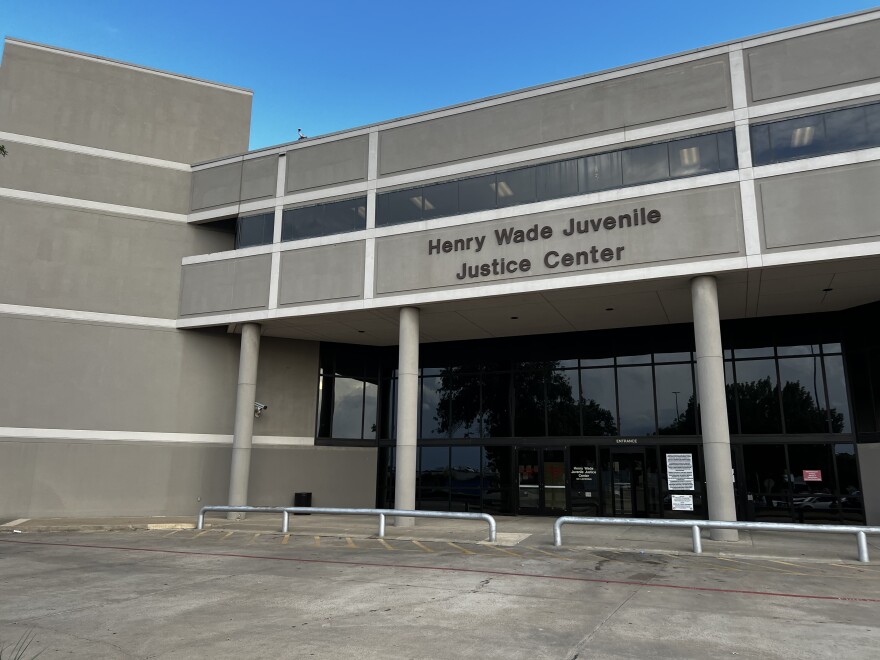A top official in Dallas County’s juvenile justice department says a March report that led to major changes in the county’s juvenile justice system was flawed.
Julie Childers, deputy director of the department’s administrative and executive services division, said while a report from national social justice research group Evident Change was necessary and “opened up lines of communication,” the department took issue with the accuracy of the group's analysis.
“Some of the metrics that were put out there by Evident Change, well, they're not attainable to even use as baselines because they were methodologically flawed in their calculations,” Childers told commissioners.
Childers made the comments during a presentation to Dallas County commissioners Tuesday, where she gave the department's own report on juvenile detention and diversion data.
Evident Change's report, which Childers confirmed uses data provided by the department itself, indicated kids move through Dallas County's juvenile justice system slower than other counties. Kids accused of crimes spend an average of 130 days in detention before a judge’s disposition — during which they decide the best course of punishment or treatment for that child — which is higher than model standards, the report says.
The report also found only 9% of cases reviewed by the district attorney’s office were moved away from the formal court system through diversion tactics like supervisory caution or deferred prosecution, which prioritize rehabilitation over punishment.
Dallas County District Attorney John Creuzot commissioned the analysis from Evident Change, and told KERA in March it brought attention to flaws in how his own office and the county processes juvenile cases.
A spokesperson for the DA's office said the office is aware of some of the juvenile department's response to the Evident Change report, but declined to comment further.
After the report’s release, commissioners voted to remove Commissioner John Wiley Price from the county's juvenile justice oversight board in April.
Price's replacement, Commissioner Andy Sommerman, expressed concern this year over how long children are kept in solitary confinement at Dallas County juvenile detention centers.
He said in an interview with KERA Wednesday he didn't see a point in going over specific numbers when the Evident Change report has already led to juvenile department improvements.
"I'm not saying that [the numbers] aren't important, OK, I'm not dismissing it, but what I am saying is: so what?" Sommerman said. "It doesn't change the way that they are treating children. It doesn't change the way that we're processing children through the juvenile department."

Childers said the department realized months after Evident Change's report came out that the county didn't provide the group with necessary data to make the report more accurate. For example, she said the department provided the date of entry into detention and the disposition date for every kid, but not the exact length of stay in detention. Those can be different, she said.
There’s also been an increase in use of detention diversion strategies in the past year, she added.
In a statement, Evident Change Director of Research Erin Espinosa wrote the center remains confident in its methodology.
"We deeply appreciate the collaboration we have experienced with the District Attorney’s Office, the Commissioners Court, the Dallas County Juvenile Justice Department, the judiciary, and local community members," the statement reads. "We share with these groups and the Juvenile Board the goal of improving the county’s juvenile justice system and we are heartened by the reforms that have already resulted."
Sommerman's request for thousands of records from the juvenile department on how long kids in detention are confined to their rooms led to the Dallas County Juvenile Department suing commissioners in May, arguing the release of that data is illegal.
The Dallas Morning News reported a state district judge ruled in August the department doesn't have to give that data to commissioners.
When Sommerman brought up his concerns about detained children in isolation during the commissioners court meeting, Price said that wasn't what the department's report was about.
"Here you go again," Price told Sommerman. "You got in there, you got your claws in there."
Price did not return a request for comment Wednesday.
Part of the issue is whether the county is properly using a common risk assessment known as the Positive Achievement Change Tool, or PACT. In its report, Evident Change cited county stakeholders who said PACT was not seen as a trusted tool in making diversion, petition or disposition decisions.
According to the report, 47% of youth in detention at the petition point of the process had a low risk of reoffending.
By contrast, the department calculated the vast majority of children detained in Dallas County from January 2022 to August 2023 were moderate or high risk.
"We have not witnessed a month where the percentage of low risk youth were anywhere near what was reported by Evident Change," Childers said.
The juvenile department hasn't been in contact with Evident Change about issues with the report, she said.
Commissioner Elba Garcia said the new research from the department seemed to come out of left field, and pointed out Evident Change relied on data the department itself provided.
"My point of view right now is, how did that happen?" Garcia said. "All of you are researchers, right? You all analyzed the same data, but, you know, different variables got you to different points."
Though County Judge Clay Jenkins said he appreciated Childers' presentation, he said it's still necessary to work together with everyone committed to improving the juvenile department.
"If we are stuck in the attitude of us against them, 'poor me, I'm being attacked,' all this sort of stuff, there's really no way we can ever win," Jenkins said.
Got a tip? Email Toluwani Osibamowo at tosibamowo@kera.org. You can follow Toluwani on Twitter @tosibamowo.
KERA News is made possible through the generosity of our members. If you find this reporting valuable, consider making a tax-deductible gift today. Thank you.





